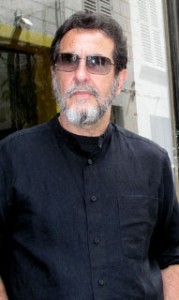 Harold Jaffe is the author of 20 books of fiction, docufiction, novels and essays, most recently OD, and forthcoming Revolutionary Brain. Numerous of Jaffe’s volumes have been translated into French, Spanish, Italian, German, Japanese, Turkish, and Serbo Croatian; and he has given interviews both in the US and abroad. Jaffe is editor-in-chief of Fiction International.
Harold Jaffe is the author of 20 books of fiction, docufiction, novels and essays, most recently OD, and forthcoming Revolutionary Brain. Numerous of Jaffe’s volumes have been translated into French, Spanish, Italian, German, Japanese, Turkish, and Serbo Croatian; and he has given interviews both in the US and abroad. Jaffe is editor-in-chief of Fiction International.
Hal, thanks for letting WIPs share excerpts from Othello Blues and Revolutionary Brain. Can you give a brief summary of these projects?
I subtitle Revolutionary Brain “essays and quasi-essays” because I do not adhere to genre codes. Several of the texts in the collection resemble fiction or docufiction. The theme of the collection describes a wide arc, but can reasonably be described as a demonstration of esthetics and culture theory that turn toward, not away, from our tormented globe.
RE Othello Blues, Shakespeare’s Othello (along with Iago, Cassio, and Desdemona) has been transposed into the mid-21st century. Othello, called Otis Crawford, Iago, and Cassio are blues musicians, the US is a shambles, and Otis divides his time between playing Mississippi delta blues and living them as a fighting member of the Steve Biko Identity, a social activist group comprised of poor people of color. The language of Othello Blues is a precisely pitched inner-city vernacular embellished with blues lyrics, most of which are invented by the ever virulent Iago. As in Shakespeare, Iago is the nominal villain, but in my version there is an eloquent passion in Iago’s hating which functions dialectically as a kind of resistance against cultural dictates.
You mentioned you’re also working on another collection. What is that one about, and how is it going so far?
Tentatively titled Quare Love, I write about deviant forms of loving. The longest narrative, for example, is called “Orlando” (an indirect hommage to Orlan, the French body-performer, and to Virginia Woolf’s ambisexual Orlando).
Orlando’s “performances,” have to do with gravely wounding herself, such as leaping from a high building, and depending on bystanders to gather her up. That is, the performance is a compelled, though silent, plea for compassion. Another narrative, called “Abductlove,” addresses the “Stockholm Syndrome,” whereby kidnapped victims identify with their abductor. In my incident, unlike, say, moronic Patty Hearst and the Symbionese Liberation Army, the kidnapped “victim” is discerning and articulate. Yet another narrative starts with a sordid scene from the film The Night Porter,” in which a pyramid of naked, wasted Jews is en-route to the gas, but near the top of the pyramid one male inmate is sodomizing another male inmate with a look of delirious joy. Then the narrative seques to prison rape where the “punk” in question, though heterosexual, begins to behave “like a woman,” by flirting with the rapists in order to ensure protection; and in the process he finds himself liking aspects of the violent sex.
Thematically, each of the narratives in Quare Love explores a “deviant” connection, because deviant is in its way the only authentic loving in a debauched and dying culture.
It’s a trip to see Othello and Desdemona and Cassio and Iago out of Venice and Cyprus and the formal constraints of Elizabethan England for the bluesy crossroads of contemporary Mississippi. What sparked such a novel conception, reincarnating Shakespeare’s characters as Delta blues musicians?
Art in certain registers is alive for me. In Paris 60 my closest affiliations were with dead artists: Baudelaire, Rimbaud, Genet, Van Gogh, Artaud, Camus, Duras, etc. I feel similarly toward certain of Shakepeare’s plays and sonnets, and Othello is one. The Othello-Iago transaction has broad implications, and for somewhat complex reasons Iago reminds me of Robert Johnson, so turning the group into futurist blues musicians with ties to the Mississippi Delta did not seem to me like a particularly unusual segue.
You describe Revolutionary Brain as a collection of essays and “quasi-essays.” Would you also say there’s a thematic tie to the book? What was your thought process in putting this one together?
You perhaps recall that I often quote Antonio Gramsci’s response (he would never volunteer it) that he “is a pessimist of the intellect but an optimist of the will.” With climate change imperiling our world, “optimist of the will” is suddenly an impossibility, Revolutionary Brain, then, is an exploration of dissent and rebellion and its raison d’etre, given our apparently terminal status.
You really have an amazing ear for dialogue, as evidenced in these excerpts. What you call “unsituated dialogues,” where conversations between unknown characters suddenly emerge, are really unique and compelling. In “Iso” this dialogue moves as quickly as a riff played on Qa’s trombone, for instance segueing from Armageddon scenarios to references to the “Jewish cowboy,” Paul Newman, and back again. Is trusting one’s writerly instinct imperative to writing in this style?
Yes, trust is crucial, but the trust depends on dexterity. I know I have a way with dialogue and I’ve always been able to pull up the slack and move the narrative along. Also, I am not afraid of a seemingly centrifugal reference. Too much emphasis has been put on symmetry and relatedness in art. Through a certain prism virtually everything relates.
Read Hal’s Work in Progress from Revolutionary Brain and Othello Blues
